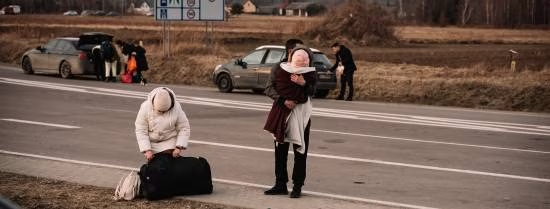More than 500 days after the onset of the war in Ukraine, the ripple effects of the war continue to reverberate around the world, with the impacts being felt in countries and vulnerable communities far removed from the epicentre of the conflict.
The fourth episode of Research InSightS LIVE took place on 29 June 2023 at The Hague Humanity Hub.
During this hybrid event, three researchers from the International Institute of Social Studies discussed the compounding effects of the war in Ukraine on global development challenges. They explored questions such as the war’s effect on the liberal international order (Professor Wil Hout), the current and long-term implications for global development (Dr Oane Visser) and its impact on vulnerable countries in the global south, such as Sri Lanka (Dr Shyamika Jayasundara-Smits).
The conversation was moderated by Adinda Ceelen.
Watch the recording of the event

Speaker highlights
Professor Wil Hout (Professor of Governance and International Political Economy) focused on the international ramifications of the war in Ukraine in relation to the operation of the so-called liberal international order.
The war violated key principles of international law, including non-aggression and sovereignty, thereby undermining the rules-based order. Professor Hout also touched upon the shift from a unipolar to a more pluralistic world order, with new alliances potentially emerging.
Some countries may choose not to align nor condemn Russia due to their economic relations with the country (for instance in relation to military goods) or a lack of trust in the legitimacy of the liberal international order. However, the ultimate outcome is uncertain, as alliances in power politics are not set in stone.
Wil Hout stressed how the Russian invasion of Ukraine should not only be understood as an attempt to rearrange the geopolitical order in Eastern Europe but needs to be assessed also as an attack on the fundamental principles governing the post-war international order.
Dr Oane Visser (Associate Professor in Agrarian Studies) spoke about the numerous compounding effects of this war on international development, particularly as regards food security.
Ukraine and Russia are major suppliers of grain and wheat for low and middle-income countries. The disruptions in the supply chain have led to shortages and higher prices with great negative repercussions for countries such as Egypt and Sudan that rely heavily on these imports.
Dr. Visser also presented two lesser-heard stories related to the war and its implications. Firstly, on an international level, he spoke about the substantial role of food traders and speculation in driving up food prices, which is rarely mentioned in media and policy discourse. Secondly, in the context of Ukraine, Dr. Visser touched upon the issue of land theft, with a recent change in law allowing the sale of farmland raises concerns about foreign investors and oligarchs taking over agricultural land, jeopardizing the livelihoods of local farmers.
He linked this to the concept of disaster capitalism, where unpopular reforms are pushed through during times of crisis. He expressed his concern about the influence of the private sector in the recovery efforts and emphasized the need for democratic control over the agenda.
Dr Shyamika Jayasundara-Smits (Assistant Professor in Conflict and Peace studies) emphasized the importance of paying attention to narratives and power dynamics in talking about and understanding the effects of conflict in different areas of the world.
She expressed their concern over the lack of attention given to the story of smaller states such as Sri Lanka. Dr. Jayasundara-Smits highlighted the impact of the war on the country's economy, which was already in a highly vulnerable state due to cumulative blows from the civil war, the Easter bomb attack and the COVID-19 pandemic with negative effects on trade, the tourism sector and remittances.
The war in Ukraine further compounded the economic crisis. A high dependency on Russia and Ukraine for wheat imports amongst others, coupled with poor government policy with negative repercussions on local agriculture, worsened the situation.
As a highly vulnerable country, Sri Lanka is unable to afford taking a strong stand in the conflict. It has a complex history in terms of its foreign policy, having benefited from relations with Russia, China and Western institutions in the past, necessitating a certain level of pragmatism.
She discussed the importance of regional organizations in resolving conflicts and the need for a more democratic and deliberative process, also mentioning the lesson learned by Sri Lanka to focus on fixing domestic issues to reduce vulnerability to external shocks.
A visual reminder of Research InSightS LIVE #4

Slides with graphs and quotes
You may also be interested in ...
Contact

Adinda Ceelen
Knowledge Broker & Research Communications Advisor
- Email address
- ceelen@iss.nl
If you would like to contribute to Research InSightS or receive more information about ISS’ knowledge exchange activities, please contact Adinda Ceelen.



